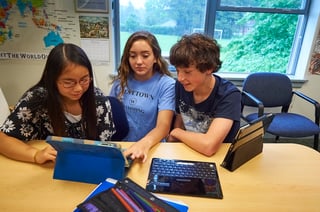
Getting your Middle Schooler to focus on academics is one of the great challenges of parenting. Friends, social networking, sports, video games, and even just staring blankly in the mirror can all hold more interest. Here are six things I’ve seen great parents do to help their children focus on learning.
- Act as if your child is already the responsible person you hope they will become. Our kids rise – and fall – to meet our expectations. Whether we say them out loud or not.
- Be interested in your child’s learning – and share your own. Instead of just asking what she learned in school today, share what you learned at work or on the news. While your children work on homework, set aside your own time for reading, writing in a journal or learning to do something new. Communicate through your actions that you value learning as a life-long activity, not just to get good grades in school.
- Avoid micromanaging. A casual offer to quiz vocabulary is great. Hovering over every assignment, editing writing or constructing the project tells your child that you don’t think she is capable and competent. Most kids can complete homework and projects to their teacher’s expectations on their own. If that doesn’t seem to be the case for your child, get in touch with her teacher or advisor to understand what is going on and develop a joint plan.
- Allow your child do work at her grade level. In our natural quest to give our children every advantage, we can sometimes forget that learning is a process. Before pressing for that advanced level, listen to what teachers have to say about your child as a learner. Sometimes the advanced level will be the right amount of challenge for him, and sometimes the additional work and faster pace will just create anxiety and shatter his confidence in the subject. Kids who get what they need in introductory courses are often more successful in future study than those who push ahead prematurely.
- Know your kid is not like other kids. It’s not just children’s bodies that go through a massive transformation during Middle School years; brains and social skills also develop at very different speeds from kid to kid. Middle School teachers are experienced at bridging these gaps and identifying learning issues. Tempting as it is, don’t assume that because your friend’s son had a particular experience, your child will, too. Or, that because a particular intervention or support was effective for him, it is what your child needs.
- Remember that you only see part of the picture. Ask teachers and advisors to share what they have observed at school about your child’s learning strategies and engagement. Share what you see at home with them, too. When adults work together, all our children benefit and succeed.


